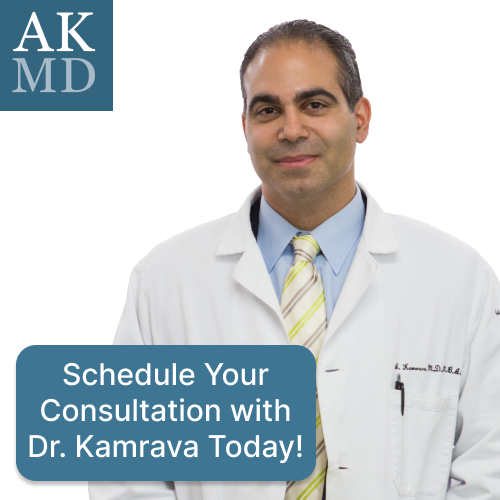You may experience anal fistula symptoms but attribute your pain and discomfort to another medical condition. On your own, it’s difficult to pinpoint your exact problem and how to treat it. Before you jump to conclusions and form your own diagnosis that may not be accurate, consider visiting a colorectal surgeon who can provide peace of mind. Dr. Kamrava provides a comfortable environment for you to discuss your symptoms and will help you get relief as soon as possible.
What Are Anal Fistulas?
At the lower end of the anus, there are small crypts that allow for deposition of necessary fluids within the canal. Stool passing through the anus passes in and out of these areas without incident. Rarely, stool impacts into one of these crypts and burrows an aberrant tract into adjacent tissue. This aberrant tract is a fistula tract.
 Anal Fistula Symptoms
Anal Fistula Symptoms
Anal fistulas often first appear as a simple perianal abscess. Most patients will seek medical care in an emergency room or through their primary care physician, where the abscess will be lanced to release the pus that has built up. The area will heal, and in the setting of an anal fistula, the abscess will recur and continue to recur until the actual fistula itself is eradicated.
Diagnosis and Treatment
When you have symptoms of an anal fistula, you most likely won’t be aware of the cause. There may be a number of health concerns that cross your mind and cause you to be overwhelmed or anxious. Numerous treatment options for anal fistulas are available, but you’ll first want to visit a doctor to determine the exact source of your issue. A physical exam is the first step that will help reveal whether or not you have an anal fistula.
Anal Fistula Frequently Asked Questions
It can be alarming to discover that you may be suffering from an anal fistula. You may not know if you need professional assistance or if the condition will go away on its own. To guide you in the right direction, here are frequently asked questions about anal fistulas. An anal fistula does require medical treatment, so please contact Dr. Kamrava at 424.279.8222 to find out more or schedule an appointment.
Q: What are common anal fistula symptoms?
A: Common fistula symptoms include pain in or around the anus, swelling in or around the anus, irritated skin, pus or blood leakage from the anus, or bowel control problems. Anal fistulas may occur as a result of bowel conditions, such as inflammatory bowel disease (IBD) or Crohn’s disease.
Q: When should I see a doctor about an anal fistula?
A: Since anal fistulas could indicate a variety of more serious medical conditions, it’s important to be evaluated by a medical professional if you experience symptoms of an anal fistula. Also, they seldom heal on their own. You will need a proper diagnosis and prescription for the best treatment in order for proper healing to occur.
Q: How is an anal fistula diagnosed?
A: A physical examination of the anus and rectum will help diagnose an anal fistula. An anoscope may be utilized to see inside of the rectum. In some cases, a fistula probe helps with the diagnosis. An MRI can be performed, as well, to find out if the anal fistula is linked to the sphincter muscles.
Q: What are the best treatment options for anal fistulas?
A: The only way to treat a fistula is to remove the entire tract. There is no perfect treatment, as it depends on how much of the anal sphincter apparatus is involved. The more muscle involved, the more intricate the procedure will become. Advanced surgeries are oftentimes staged over several weeks, with the goal of curing the fistula while preserving the integrity of the anal sphincter muscles.
Q: What is this new “Laser” treatment for anal fistulas?
A: FiLAC is a new Fistula Laser Closure treatment that has been utilized for a number of years in other countries and has been recently introduced into the United States. Dr. Kamrava owns his own laser system and has been successfully utilizing it treat difficult and deep fistulas that involve a significant portion of the sphincter muscles. Studies have shown that it has equivalent outcomes as advanced flap techniques and the LIFT procedure, with a significantly reduced rate of complications and down time. This is, at the moment, the most cutting edge treatment available for anal fistulas.
Q: How long does it take to recover after anal fistula surgery?
A: Anal fistula surgery is performed under anesthesia, so you won’t be in any pain or discomfort during surgery, but pain medication will be required as you recover. Because the anus cannot be isolated after surgery (as, for example, a broken bone is casted for several weeks after surgery), pain for the first 1 – 2 weeks is normal. Dr. Kamrava will discuss the best ways to heal after surgery, and you should be able to resume normal activities within one week.
Call Today to Schedule an Anal Fistula Consultation With Dr. Kamrava
To cure your anal fistula, schedule an appointment with Dr. Kamrava. During your consultation, Dr. Kamrava will answer any questions you may have and determine the specific treatment plan that best suits your individual needs. Call 424.279.8222 today!
Next, learn about colon cancer.




